Econometric Tools for Macroeconomic Forecasting and Simulation
The aim of this research group is to enhance research on, and development, implementation, evaluation, and application of quantitative macroeconometric models for forecasting and analysing aggregate economic fluctuations and developments. Research in this group contributes to the econometric foundation and the methodological improvements of the IWH forecasts. During the last years, the IWH has highly specialised in macroeconomic modelling, both for flash estimates and medium-term projections. Furthermore, this group conducts comprehensive empirical analysis and develops econometric tools that are used for third-party funded projects. In the last years, particular models have been developed for e.g. Volkswagen Financial Services AG and for GIZ. The research group contributed in particular on macroeconomic modelling for ministries in Kyrgyzstan and Tajikistan as well as for the institute of forecasting and macroeconomic research (IFMR) Uzbekistan.
IWH Data Project: IWH Real-time Database
Research Cluster
Economic Dynamics and StabilityYour contact

Mitglied - Department Macroeconomics
EXTERNAL FUNDING
07.2022 ‐ 12.2026
Evaluation of the InvKG and the federal STARK programme
German Federal Ministry for Economic Affairs and Climate Action
On behalf of the Federal Ministry of Economics and Climate Protection, the IWH and the RWI are evaluating the use of the approximately 40 billion euros the federal government is providing to support the coal phase-out regions..
10.2019 ‐ 01.2023
Climate Resilient Economic Development
Deutsche Gesellschaft für Internationale Zusammenarbeit (GIZ) GmbH
Climate change has a substantial impact on economic growth and a country’s development. This increases the need for reliable and viable approaches to assessing the impact of climate risks and potential adaptation scenarios. Political decision-makers in ministries of planning and economy need sound forecasts in order to design and finance adequate economic policy instruments and actively to take countermeasures. In the pilot countries (Georgia, Kazakhstan and Vietnam), climate risk is included in macroeconomic modelling, enabling the results to be integrated into the policy process so as to facilitate adapted economic planning. The IWH team is responsible for macroeconomic modelling in Vietnam.
05.2020 ‐ 09.2023
ENTRANCES: Energy Transitions from Coal and Carbon: Effects on Societies
European Commission
ENTRANCES aims at examining the effects of the coal phase-out in Europe. How does the phase-out transform society – and what can politics do about it?
This project has received funding from the European Union’s Horizon 2020 research and innovation programme under grant agreement No 883947.
01.2018 ‐ 12.2023
EuropeAid (EU Framework Contract)
European Commission
07.2016 ‐ 12.2018
Climate Protection and Coal Phaseout: Political Strategies and Measures up to 2030 and beyond
Umweltbundesamt (UBA)
01.2017 ‐ 12.2017
Support to Sustainable Economic Development in Selected Regions of Uzbekistan
Deutsche Gesellschaft für Internationale Zusammenarbeit (GIZ) GmbH
01.2017 ‐ 12.2017
Short-term Macroeconomic Forecasting Model in Ministry of Economic Development and Trade of Ukraine
Deutsche Gesellschaft für Internationale Zusammenarbeit (GIZ) GmbH
01.2016 ‐ 12.2017
Development of analytical tools based on Input-Output table
Deutsche Gesellschaft für Internationale Zusammenarbeit (GIZ) GmbH
The aim of the project was the development of an analytical tool to assess the gains and losses of possible state programs supporting the development of the private sector of the Tajik economy.
11.2015 ‐ 12.2016
Employment and Development in the Republic of Uzbekistan
Deutsche Gesellschaft für Internationale Zusammenarbeit (GIZ) GmbH
Support to sustainable economic development in selected regions of Uzbekistan
05.2016 ‐ 05.2016
Framework and Finance for Private Sector Development in Tajikistan
Deutsche Gesellschaft für Internationale Zusammenarbeit (GIZ) GmbH
02.2016 ‐ 04.2016
Macroeconomic Reforms and Green Growth - Assessment of economic modelling capacity in Vietnam
Deutsche Gesellschaft für Internationale Zusammenarbeit (GIZ) GmbH
Refereed Publications
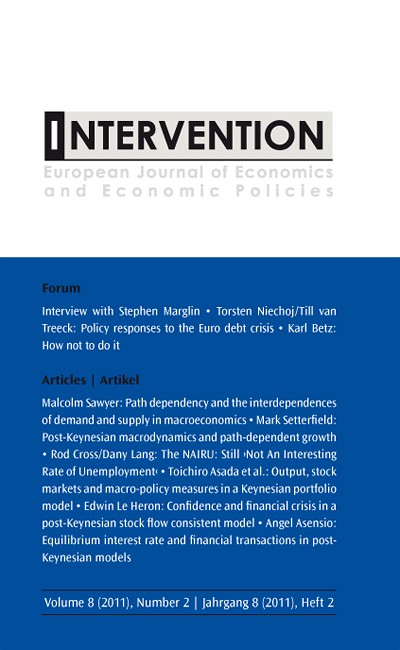
Fiscal Spending Multiplier Calculations Based on Input-Output Tables? An Application to EU Member States
in: Intervention. European Journal of Economics and Economic Policies, No. 1, 2012
Abstract
Fiscal spending multiplier calculations have attracted considerable attention in the aftermath of the global financial crisis. Much of the current literature is based on VAR estimation methods and DSGE models. In line with the Keynesian literature we argue that many of these models probably underestimate the fiscal spending multiplier in recessions. The income-expenditure model of the fiscal spending multiplier can be seen as a good approximation under these circumstances. In its conventional form this model suffers from an underestimation of the multiplier due to an overestimation of the import intake of domestic absorption. In this article we apply input-output calculus to solve this problem. Multipliers thus derived are comparably high, ranging between 1.4 and 1.8 for many member states of the European Union. GDP drops due to budget consolidation might therefore be substantial in times of crisis.
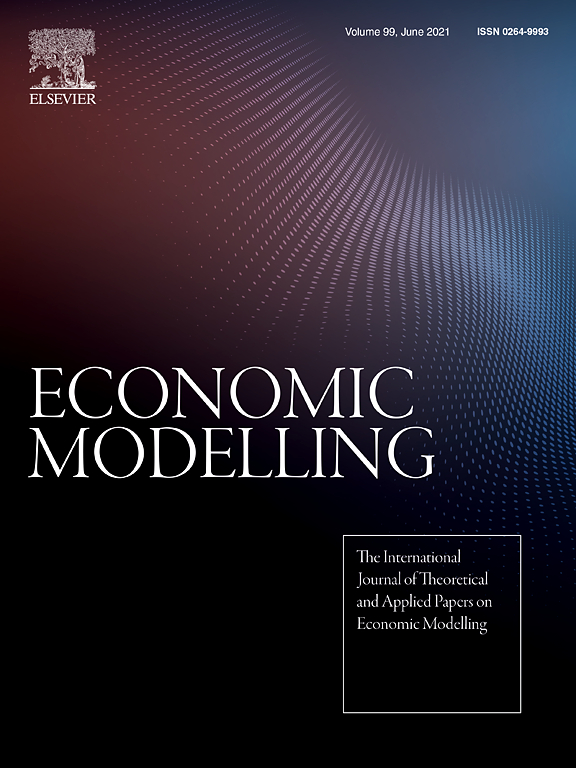
The Halle Economic Projection Model
in: Economic Modelling, No. 4, 2012
Abstract
In this paper we develop an open economy model explaining the joint determination of output, inflation, interest rates, unemployment and the exchange rate in a multi-country framework. Our model -- the Halle Economic Projection Model (HEPM) -- is closely related to studies published by Carabenciov et al. Our main contribution is that we model the Euro area countries separately. In doing so, we consider Germany, France, and Italy which represent together about 70 percent of Euro area GDP. The model combines core equations of the New-Keynesian standard DSGE model with empirically useful ad-hoc equations. We estimate this model using Bayesian techniques and evaluate the forecasting properties. Additionally, we provide an impulse response analysis and a historical shock decomposition.
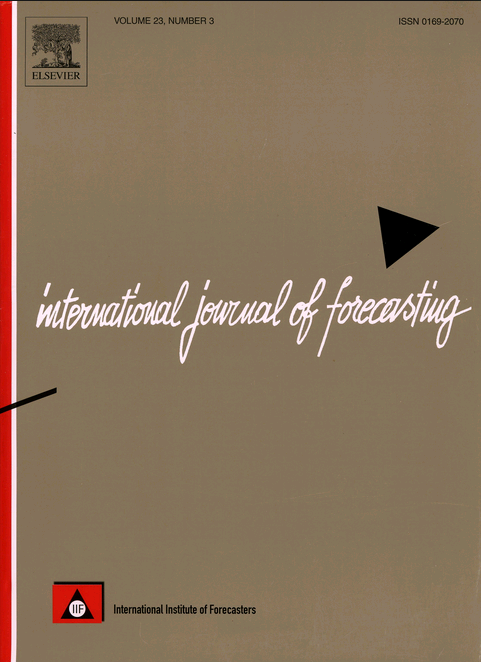
The Performance of Short-term Forecasts of the German Economy before and during the 2008/2009 Recession
in: International Journal of Forecasting, No. 2, 2012
Abstract
The paper analyzes the forecasting performance of leading indicators for industrial production in Germany. We focus on single and pooled leading indicator models both before and during the financial crisis. Pairwise and joint significant tests are used to evaluate single indicator models as well as forecast combination methods. In addition, we investigate the stability of forecasting models during the most recent financial crisis.
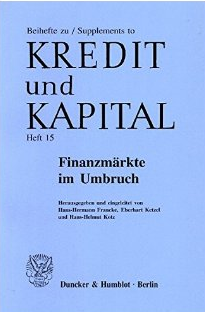
The Financial Crisis from a Forecaster's Perspective
in: Kredit und Kapital, No. 1, 2012
Abstract
This paper analyses the recession in 2008/2009 in Germany. This recession is very different from previous recessions in particular regarding their causes and magnitude. We show to what extent forecasters and forecasts based on leading indicators fail to detect the timing and the magnitude of the recession. This study shows that large forecast errors for both expert forecasts and forecasts based on leading indicators resulted during this recession which implies that the recession was very difficult to forecast. However, some leading indicators (survey data, risk spreads, stock prices) have indicated an economic downturn and hence, beat univariate time series models. Although the combination of individual forecasts provides an improvement compared to the benchmark model, the combined forecasts are worse than several individual models. A comparison of expert forecasts withthe best forecasts based on leading indicators shows only minor deviations. Overall, the range for an improvement of expert forecasts in the crisis compared to indicator forecasts is small.
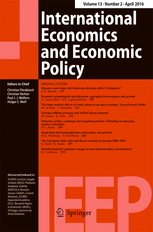
An Evolutionary Algorithm for the Estimation of Threshold Vector Error Correction Models
in: International Economics and Economic Policy, No. 4, 2011
Abstract
We develop an evolutionary algorithm to estimate Threshold Vector Error Correction models (TVECM) with more than two cointegrated variables. Since disregarding a threshold in cointegration models renders standard approaches to the estimation of the cointegration vectors inefficient, TVECM necessitate a simultaneous estimation of the cointegration vector(s) and the threshold. As far as two cointegrated variables are considered, this is commonly achieved by a grid search. However, grid search quickly becomes computationally unfeasible if more than two variables are cointegrated. Therefore, the likelihood function has to be maximized using heuristic approaches. Depending on the precise problem structure the evolutionary approach developed in the present paper for this purpose saves 90 to 99 per cent of the computation time of a grid search.
Working Papers
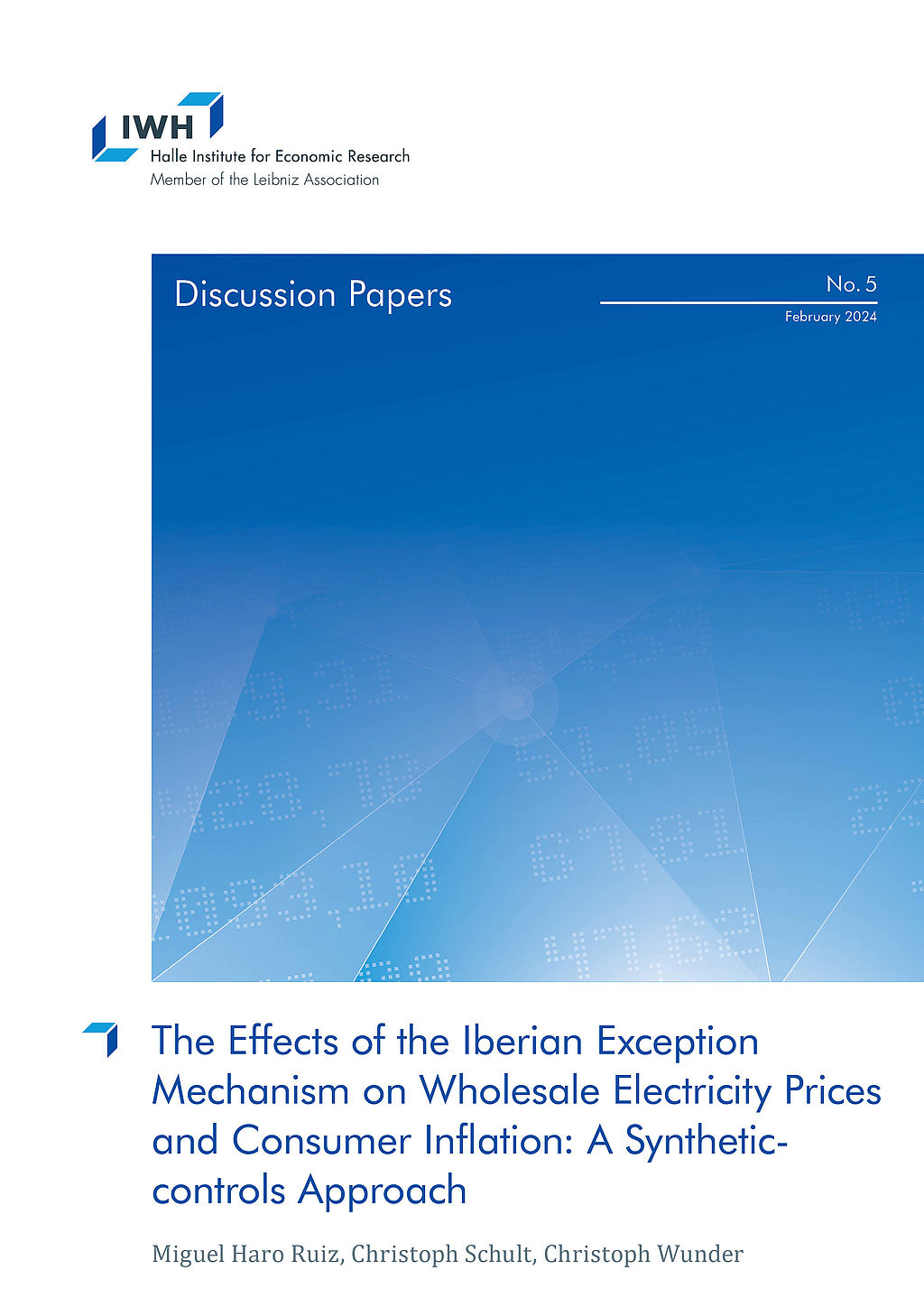
The Effects of the Iberian Exception Mechanism on Wholesale Electricity Prices and Consumer Inflation: A Synthetic-controls Approach
in: IWH Discussion Papers, No. 5, 2024
Abstract
This study employs synthetic control methods to estimate the effect of the Iberian exception mechanism on wholesale electricity prices and consumer inflation, for both Spain and Portugal. We find that the intervention led to an average reduction of approximately 40% in the spot price of electricity between July 2022 and June 2023 in both Spain and Portugal. Regarding overall inflation, we observe notable differences between the two countries. In Spain, the intervention has an immediate effect, and results in an average decrease of 3.5 percentage points over the twelve months under consideration. In Portugal, however, the impact is small and generally close to zero. Different electricity market structures in each country are a plausible explanation.
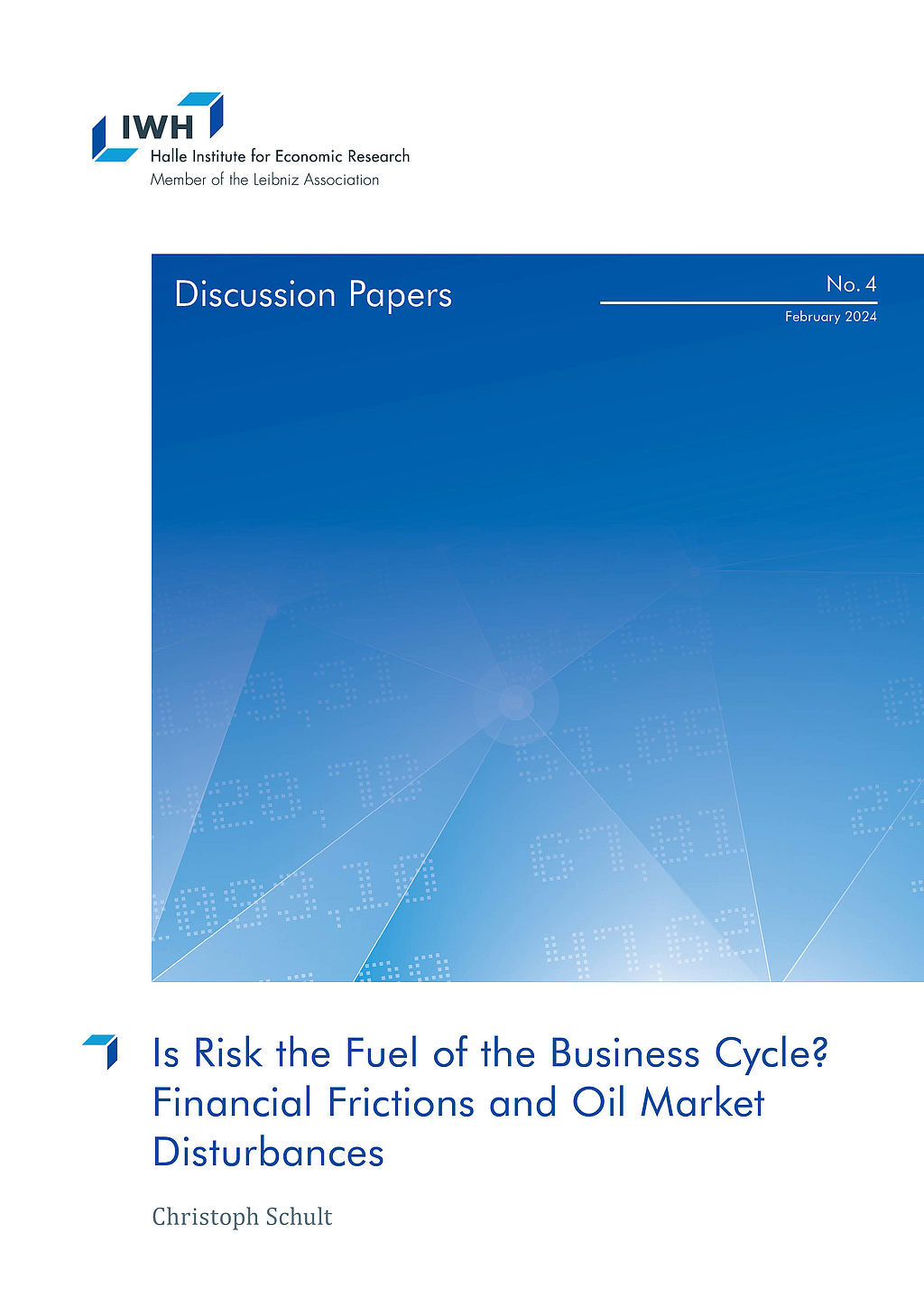
Is Risk the Fuel of the Business Cycle? Financial Frictions and Oil Market Disturbances
in: IWH Discussion Papers, No. 4, 2024
Abstract
I estimate a dynamic stochastic general equilibrium (DSGE) model for the United States that incorporates oil market shocks and risk shocks working through credit market frictions. The findings of this analysis indicate that risk shocks play a crucial role during the Great Recession and the Dot-Com bubble but not during other economic downturns. Credit market frictions do not amplify persistent oil market shocks. This result holds as long as entry and exit rates of entrepreneurs are independent of the business cycle.
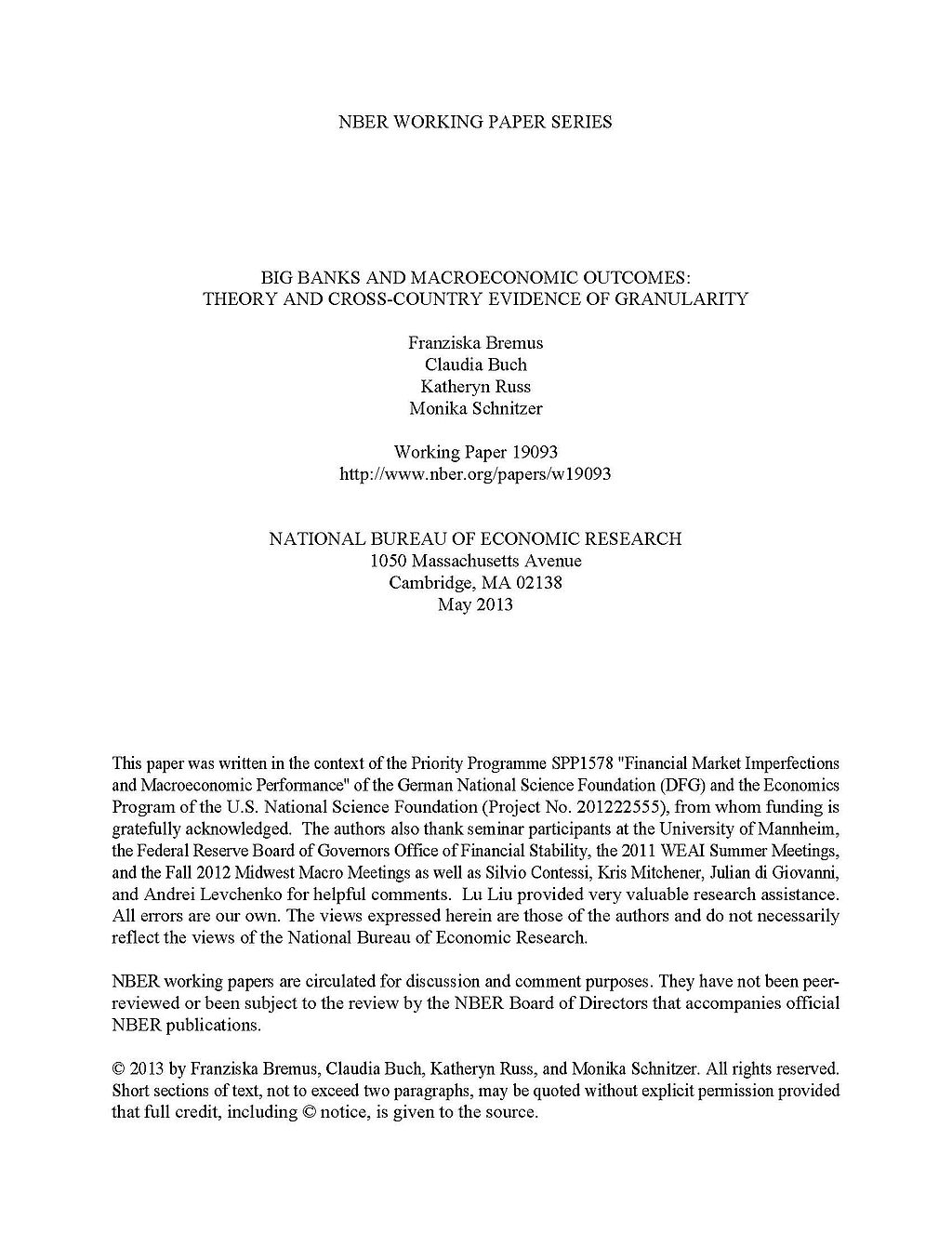
Expectations, Infections, and Economic Activity
in: NBER Working Paper, No. 27988, April 2022
Abstract
The Covid epidemic had a large impact on economic activity. In contrast, the dramatic decline in mortality from infectious diseases over the past 120 years had a small economic impact. We argue that people's response to successive Covid waves helps reconcile these two findings. Our analysis uses a unique administrative data set with anonymized monthly expenditures at the individual level that covers the first three Covid waves. Consumer expenditures fell by about the same amount in the first and third waves, even though the risk of getting infected was larger in the third wave. We find that people had pessimistic prior beliefs about the case-fatality rates that converged over time to the true case-fatality rates. Using a model where Covid is endemic, we show that the impact of Covid is small when people know the true case-fatality rate but large when people have empirically-plausible pessimistic prior beliefs about the case-fatality rate. These results reconcile the large economic impact of Covid with the small effect of the secular decline in mortality from infectious diseases estimated in the literature.
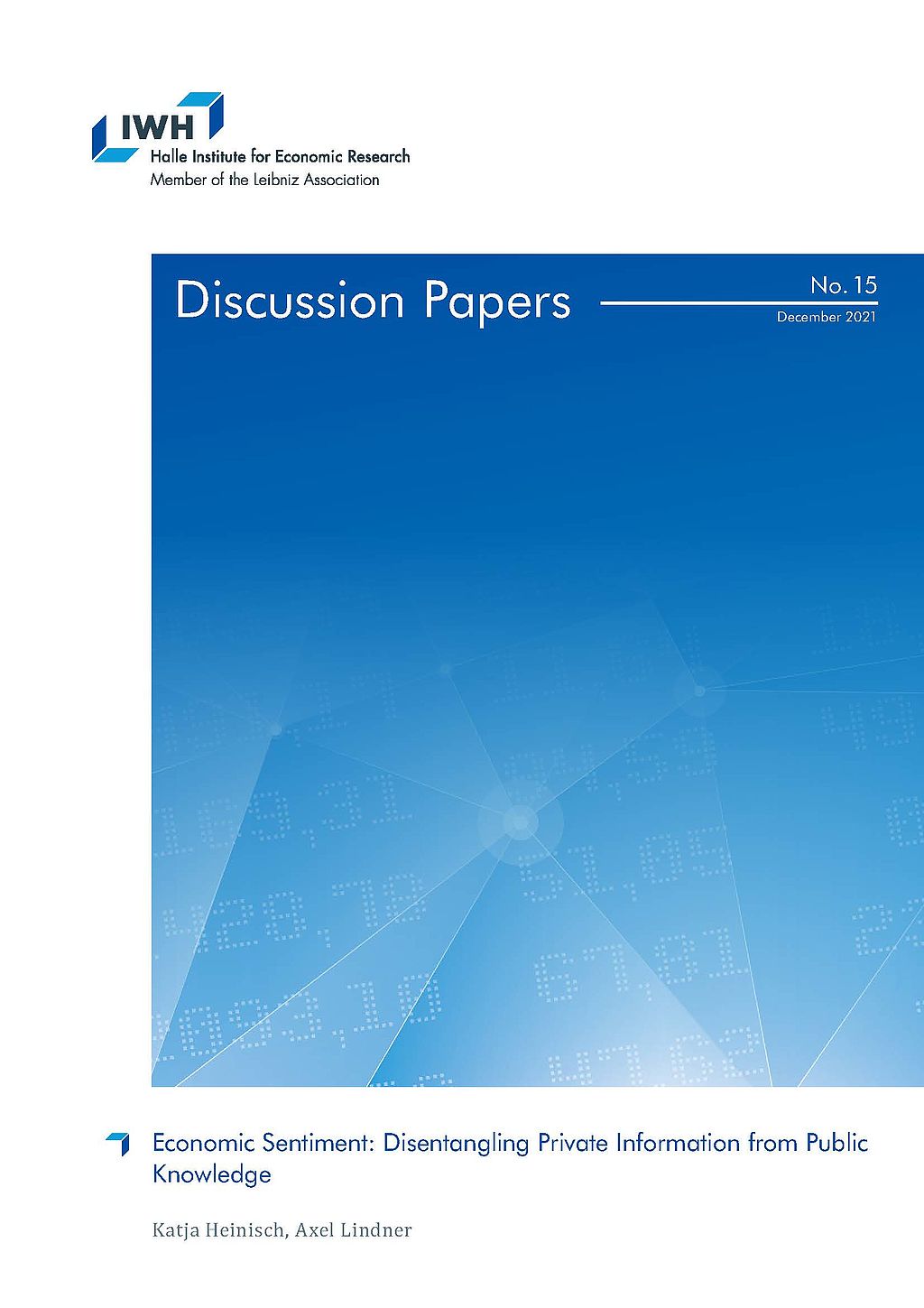
Economic Sentiment: Disentangling Private Information from Public Knowledge
in: IWH Discussion Papers, No. 15, 2021
Abstract
This paper addresses a general problem with the use of surveys as source of information about the state of an economy: Answers to surveys are highly dependent on information that is publicly available, while only additional information that is not already publicly known has the potential to improve a professional forecast. We propose a simple procedure to disentangle the private information of agents from knowledge that is already publicly known for surveys that ask for general as well as for private prospects. Our results reveal the potential of our proposed technique for the usage of European Commissions‘ consumer surveys for economic forecasting for Germany.
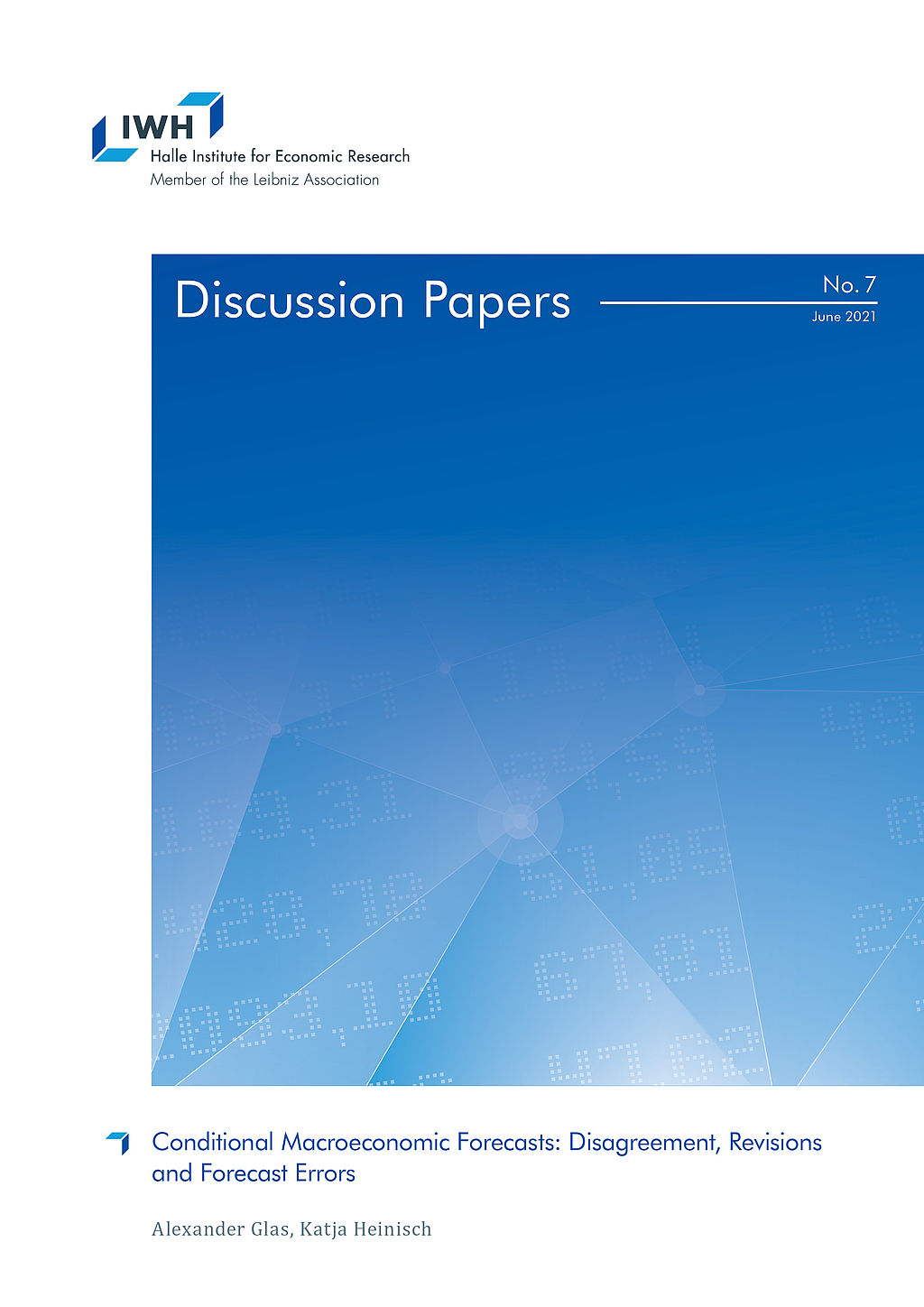
Conditional Macroeconomic Forecasts: Disagreement, Revisions and Forecast Errors
in: IWH Discussion Papers, No. 7, 2021
Abstract
Using data from the European Central Bank‘s Survey of Professional Forecasters, we analyse the role of ex-ante conditioning variables for macroeconomic forecasts. In particular, we test to which extent the heterogeneity, updating and ex-post performance of predictions for inflation, real GDP growth and the unemployment rate are related to assumptions about future oil prices, exchange rates, interest rates and wage growth. Our findings indicate that inflation forecasts are closely associated with oil price expectations, whereas expected interest rates are used primarily to predict output growth and unemployment. Expectations about exchange rates and wage growth also matter for macroeconomic forecasts, albeit less so than oil prices and interest rates. We show that survey participants can considerably improve forecast accuracy for macroeconomic outcomes by reducing prediction errors for external conditions. Our results contribute to a better understanding of the expectation formation process of experts.

















